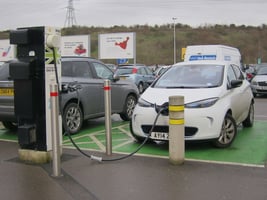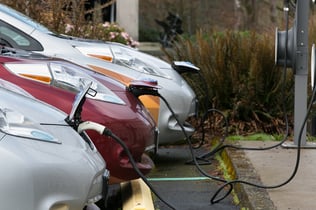Electric vehicles (EVs) are the future. Heavy investment has been made by both the government by providing funding to encourage uptake and car manufacturers to ensure that they have the technology in place. But when is the right time for you to leave traditional petrol and diesel vehicles behind and invest in a green fleet?
The growth in electric vehicles
The electric car market is growing apace, with over 85,000 plug-in cars now registered in the UK at the beginning of this year. This is a dramatic increase from a mere 3,500 on the roads only three years ago. The next three years is set to see this number rise to over 1 million EVs and 350,000 plug-in hybrid vehicles. And with over 31 million cars currently on our roads, the Committee for Climate Change believes that the market for EVs and plug-in hybrids needs to reach 16% by 2020 in order to meet government targets. To help achieve this grants are available to help make the switch.
Are they expensive to buy and run?
EVs are initially more expensive to buy than traditional vehicles. To encourage adoption, government grants are available up to £4,500 off the purchase price of a new vehicle, depending on the model, and £8,000 off the price of a new van.
Here is the first saving - company car tax on EVs is lower than that of combustion engine vehicles. Currently set at 7% for this year, the tax on EVs will rise to 9% in the next financial year. But this is still a saving on petrol and diesel vehicles, with tax ranging from 11% to 37% for the more expensive, higher emission cars.
And the second saving - reduced running costs. Depending on the EV model choice, a charge can cost from as little as 2p per mile. If you travel mainly motorway miles, some EVs have the capacity to cover over 300 miles on a single charge with ongoing technological developments set to see this rise. Hybrid vehicles deliver a range of nearer 800 miles. Almost all motorway services have rapid chargers installed with the capacity to recharge a car by 80% capacity in under 30 minutes.
So although an EV car is initially more expensive to purchase, costs savings can soon be made by the reduced running costs.
Availability of charge points
An increase in EVs taking to the roads has seen the UK network of charge points grow too. Over 4,000 charge points are now installed across the country and this number is increasing rapidly. There are a choice of four types of EV charge points - slow, fast, rapid AC and rapid DC. Slow chargers (3 kW) are best suited to overnight charging, either at home or on the company premises. Fast chargers (7-22 kW) can fully charge some vehicles in around 3-4 hours. Rapid chargers (43-50 kW), are usually found at motorway service stations and can provide an 80% recharge in 30 minutes. The fast chargers that have seen the largest percentage in increase adoption.
 Nissan have reported that they expect to see the number of EV charge point installations sky rocket, believing that by as soon as 2030, they will outnumber traditional fuel stations. Similarly, a report by Solar Media suggests that the number of charge points installed across the UK will exceed 50,000 by 2030.
Nissan have reported that they expect to see the number of EV charge point installations sky rocket, believing that by as soon as 2030, they will outnumber traditional fuel stations. Similarly, a report by Solar Media suggests that the number of charge points installed across the UK will exceed 50,000 by 2030.
Every supermarket, railway station, hotel and business visitor bay is expected to have a charge point installed. Planning regulations for new office and retail developments are to include charge points. And even Shell is planning on rolling out EV charge points on some forecourts as early as this year. This is a landmark move for the company who until recently favoured biofuel as an alternative fuel source.
Handy apps such as the one produced by Zap-Map list the network of public charge points across the country. These help plan recharging points along journeys with use made available through a subscribed charge card scheme.
Charge points at work and home
An electric fleet will require charge points installed on the business premises and potentially at employee homes too. To help cover part of the cost of a charge point installation, the government are running several grant schemes. Eligibility for the grants, which is managed by the Office for Low Emission Vehicles (OLEV), is through the appointment of an accredited installer such as Noble Green Energy. The Workplace Charge Scheme grant is capped at a maximum of 20 installs across the business whereas the Electric Vehicle Homecharge Scheme is limited to one install per household. For full eligibility criteria, visit www.gov.uk
Will electric cars take over from petrol and diesel?
cars take over from petrol and diesel?
The falling costs of lithium-ion batteries used to power the vehicles could see EVs undercut the cost of petrol and diesel cars by as soon as 2022. The Committee on Climate Change believe that to reach necessary carbon reduction levels by 2030, 60% of new car sales in the UK should be electric. To push this the government has increased spending to over £600 million on incentivising the uptake of ultra-low emission vehicles.
Car manufacturers are investing millions into the technology. Nissan, Tesla, Mitsubishi, Renault, Volkswagen and even Jaguar are all in the EV race and have at least on vehicle in their portfolio. Other manufacturers have plans to add to their range too. The government has committed to make nearly all cars and vans in the UK zero emissions by 2050, which gives a clear indication as to the direction in which motoring is heading.
Cities set to encourage electric vehicle adoption
Nottingham is set to have its own 'electric' lane which is a first in the UK. Set to open later in the year, the £6m Nottingham ECO Expressway, has been funded by the Derbyshire and Nottinghamshire Local Enterprise Partnership. The initiative is part of a £40m share of government funding to increase the uptake of electric and hybrid vehicles.
London has now introduced a low emission charge to discourage the most polluting diesel cars from entering the city. The charge, which is set at £10 per day, may be rolled out at other cities too as efforts to reduce air pollution increase.
With so much funding and support already in place for EVs, the future for transport is most certainly looks electric. To find out more about EV charge point installations for business and domestic properties, please get in touch.


